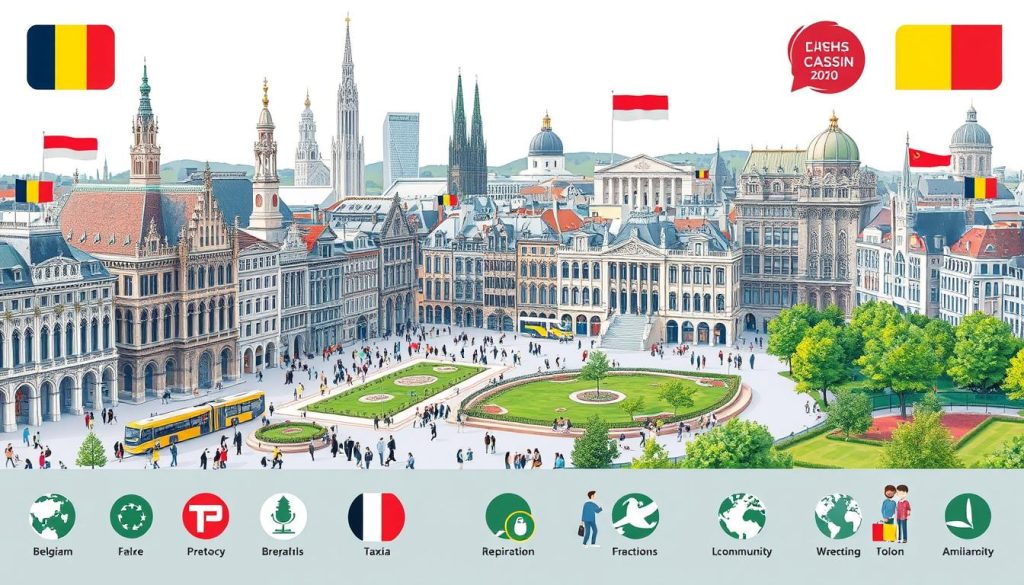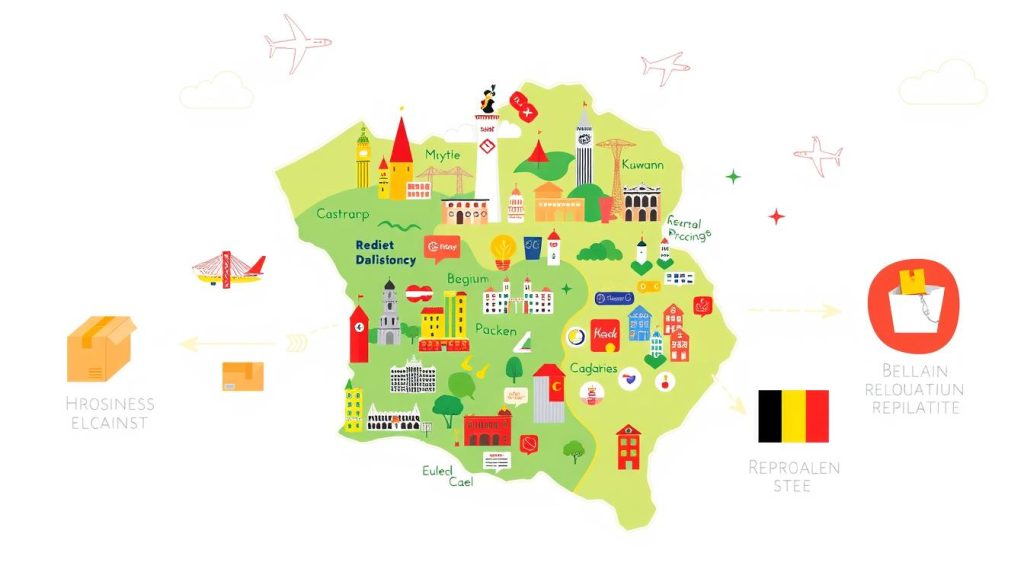The prospect of relocating to Belgium for business ventures is not merely an opportunity but a strategic imperative for entrepreneurs and corporations. Situated at the epicentre of Europe, Belgium emerges as a critical nexus for international trade, facilitating unparalleled access to the vast EU market. The country’s linguistic diversity, with proficiency in multiple languages, enables businesses to harness a globalised workforce, thereby ensuring effective communication and collaboration across geographical divides. Additionally, Belgium’s advanced infrastructure underpins the smooth operation of logistics, thereby enhancing operational efficiency, making it a prime destination for those contemplating Belgium business relocation.
Overview of Belgium as a Business Destination
Belgium emerges as a premier choice for entrepreneurs eager to capitalise on business opportunities within its borders. Strategically positioned at the heart of Europe, it offers unparalleled access to adjacent markets, solidifying its status as a pivotal business nexus. The country’s comprehensive transport infrastructure ensures unimpeded logistics, empowering enterprises to navigate international markets with ease.

The political stability in Belgium creates a secure backdrop for both indigenous and international businesses to thrive. Characterised by a competitive economy that thrives on innovation and diversity, Belgian cities are hubs for a myriad of industries, ranging from technology to manufacturing. This economic dynamism opens up a plethora of business opportunities, drawing in organisations intent on expansion.
The quality of life in Belgium is another significant factor. It offers an unparalleled standard of living, making it an attractive locale for expatriates. The availability of superior amenities, healthcare, and educational facilities contributes to a conducive work environment, thereby facilitating the success of business ventures.
In conclusion, Belgium is swiftly cementing its reputation as a distinguished business destination. Here, entrepreneurs can delve into vibrant opportunities within a robust and supportive ecosystem.
Key Factors to Consider When Relocating
Embarking on a relocation to Belgium presents an array of complexities, yet it also harbours the potential for significant personal and professional growth. A comprehensive understanding of the key factors involved is paramount to ensure a seamless transition and effective integration into the local business environment.

The local business environment stands as a cornerstone in the relocation process. A thorough examination of the regulatory landscape, prevailing business practices, and market dynamics is indispensable. Additionally, a grasp of local tax policies can profoundly influence operational success.
Language proficiency is another critical consideration. Belgium’s linguistic diversity, encompassing Dutch, French, and German, necessitates either prior knowledge or a commitment to learning these tongues. Such linguistic proficiency is instrumental in fostering effective communication and cultivating meaningful relationships with local stakeholders.
Cultural nuances significantly influence business interactions. A deep understanding of these cultural differences is crucial for establishing robust connections with clients and colleagues. Engaging with local customs and business etiquette can facilitate smoother navigation through social and professional environments.
- Cost of living varies significantly between cities, so consider this aspect carefully.
- Healthcare and social security are essential for expatriates.
- Evaluate local amenities and public services that may impact day-to-day life.
Strategic planning and exhaustive research are fundamental to successful relocation. Establishing clear objectives and preparing for potential hurdles is essential. This groundwork lays the foundation for a successful relocation journey.
Relocating to Belgium for Business: A Step-by-Step Guide
The intricacies of relocating for business in Belgium are paramount for any entrepreneur. This guide elucidates the process of familiarising oneself with the country’s varied regions and identifying potential opportunities within its pivotal industries.
Understanding the Locale and Regions
Belgium is segmented into three primary regions: Flanders, Wallonia, and Brussels-Capital. Each region proffers distinct advantages and economic prowess. Flanders, with its emphasis on technology and logistics, has emerged as a burgeoning epicentre for innovative enterprises. Conversely, Wallonia, endowed with abundant natural resources, houses prominent sectors such as pharmaceuticals and aerospace. The bilingual capital, Brussels, not only functions as a political nucleus but also cultivates a robust milieu for international commerce, drawing investors from across the globe.
Identifying Opportunities in Key Industries
Belgium’s business sectors offer myriad avenues for expansion and investment. Notable sectors include:
- Technology: A burgeoning environment for start-ups and established entities alike.
- Pharmaceuticals: With leading corporations and research entities, this sector propels innovation.
- Logistics: Leveraging Belgium’s strategic locale, this industry continues to burgeon substantially.
Each of these sectors presents opportunities deserving of exploration during your relocation to Belgium, underscoring the importance of aligning your business strategy with regional fortitudes.

Belgium Business Infrastructure
In the realm of commerce, Belgium’s infrastructure stands as a beacon, drawing enterprises in pursuit of operational excellence. The country’s dedication to a robust infrastructure framework is pivotal, enabling businesses to flourish amidst a competitive milieu. This framework encompasses a superior transport network and state-of-the-art telecommunications, thereby fostering an environment conducive to a myriad of industries.
Transport and Logistics in Belgium
The transport logistics sector in Belgium exemplifies excellence, boasting an extensive network of roads, railways, and airports. This comprehensive connectivity ensures the seamless transportation of goods across borders, positioning Belgium as a pivotal hub for international trade. The transport logistics in Belgium offer several key advantages:
- Access to major European markets within a few hours by road or rail.
- A well-developed port infrastructure, including the Port of Antwerp, one of the largest in the world.
- Efficient customs processes that streamline import and export activities.
Telecommunications and Digital Connectivity
For contemporary businesses, robust telecommunications systems are indispensable. Belgium’s dedication to enhancing its digital infrastructure has resulted in widespread broadband coverage and innovation in mobile technology. The elements contributing to this advanced telecommunications environment are:
- High-speed internet access that supports remote working and digital operations.
- Strong cybersecurity measures ensuring data protection for businesses.
- Reliable mobile networks facilitating constant connectivity.

Legal Requirements for Setting Up a Business in Belgium
The legal framework for establishing a business in Belgium is paramount for entrepreneurs aiming to penetrate this dynamic market. A plethora of legal entities are accessible, ranging from sole proprietorships to partnerships and limited liability companies. Each entity type imparts distinct implications regarding liability, taxation, and governance.
The registration process necessitates a formal presence with the Crossroads Bank for Enterprises, acting as a unified portal for business registration within Belgium. This involves submitting critical documentation, including a business plan, identification, and proof of address. Depending on the sector, obtaining requisite permits and licenses may also be obligatory. Adherence to these regulations is imperative for uninterrupted business operations.

Compliance with Belgian labour laws is fundamental to a company’s stability. This encompasses a deep understanding of employee rights, minimum wage stipulations, and occupational health and safety standards. Failure to comply can lead to severe financial repercussions. Hence, acquiring comprehensive knowledge of both local and national business regulations is a critical aspect of the legal framework for businesses in Belgium.
Belgium Corporate Immigration Policies
Belgium’s corporate immigration framework is meticulously designed to facilitate the expansion or establishment of businesses within its borders. This framework necessitates a thorough comprehension of the policies and procedures by both employers and employees. The regulatory landscape is pivotal for those navigating the complexities of Belgium immigration for corporates.
Entrepreneurs intent on importing foreign talent must navigate a plethora of visas and permits. Essential documentation includes:
- Work permits for foreign employees, which can vary based on job categories and the length of employment.
- Intra-corporate transfer permits, designed for employees from companies with branches in Belgium.
- Self-employment visas, suitable for entrepreneurs establishing their businesses in Belgium.
The application process for these permits is of paramount importance. It entails the submission of various documents, such as proof of employment, qualifications, and sometimes an employment contract. A comprehensive understanding of the qualifications required for obtaining work permits is essential for compliance with corporate immigration policies.
Businesses must remain vigilant regarding sector-specific requirements. A proactive stance towards understanding these regulations is crucial. It enables companies to seamlessly integrate foreign workforce members, thereby enhancing their operational capabilities in Belgium.

Understanding Belgium Tax Regulations for Businesses
Embarking on a business venture in Belgium necessitates a thorough comprehension of the country’s tax regulations. Knowledge of corporate tax rates in Belgium is paramount for making strategic financial decisions, ensuring adherence to legal requirements, and facilitating effective financial planning.
Overview of Corporate Tax Rates
The corporate tax rates in Belgium are competitively positioned within the European framework. The standard rate is currently set at 25%, with provisions for relief for small and medium-sized enterprises (SMEs). SMEs can benefit from a reduced rate of 20% on profits up to €100,000. Grasping these rates is essential for optimising tax liabilities.
Tax Incentives for Foreign Businesses
Belgium endeavours to entice foreign investment through various tax incentives. These incentives are crafted to bolster specific sectors, fostering innovation and employment. Noteworthy incentives include:
- R&D tax credits for companies investing in research and development.
- Investment deductions allowing businesses to reduce their taxable income based on eligible investments.
- Special regimes for international companies that meet specific criteria.
Comprehending these Belgium tax regulations and the incentives available is crucial for establishing a thriving business environment. Engaging with local tax experts is highly recommended to adeptly navigate the complexities of tax compliance.

Expat Business Belgium: Advantages and Challenges
Embarking on a venture in Belgium as an expatriate unveils a plethora of prospects. The country’s strategic location in Europe offers unparalleled access to diverse markets and clientele. Its advanced infrastructure ensures seamless logistics and distribution processes. Furthermore, Belgium extends various incentives to foreign investors, enhancing its appeal as a business hub.
However, the path to success is not without its hurdles. Language barriers, prevalent in regions where French, Dutch, or German are the dominant tongues, can be a formidable challenge. Navigating the intricacies of local regulations, which may diverge from those of the expatriate’s homeland, adds to the complexity. Additionally, grasping the subtleties of local business etiquette and communication styles is crucial for success.
- Network effectively with other expatriates and local entrepreneurs.
- Consider language classes to ease communication gaps.
- Familiarise yourself with Belgium’s business customs and practices.
Recognising these obstacles at the outset enables expatriates to develop strategies for overcoming them. This proactive approach ensures their ability to flourish within the Belgian business environment.

Choosing the Right Moving Company to Belgium
The process of relocating to Belgium, while potentially exhilarating, presents significant challenges, particularly in identifying a suitable moving company. The necessity for meticulous organisation and strategic planning cannot be overstated. It is imperative to consider various factors that will determine the most appropriate match for your specific requirements.
It is advisable to select companies with a demonstrated track record in international relocations. Their expertise in navigating local customs and adhering to regulations can significantly reduce the stress associated with the relocation process. Customer reviews serve as a valuable resource, offering insights into the quality of service provided. These testimonials frequently highlight the efficiency, reliability, and superior customer service, all critical attributes when selecting movers for a Belgium relocation.
Obtaining multiple quotes is a prudent step to compare services and pricing. Create a list of potential movers and engage in discussions regarding your specific needs. This method enables you to assess their responsiveness and professionalism. It is also crucial to inquire about additional services, such as packing and storage options.
- Verify that the moving company offers adequate insurance and liability coverage.
- Ask about their procedures for handling fragile or valuable items.
- Inquire about the estimated timeline for the move.
It is essential to comprehend the terms and conditions of the chosen moving company. This due diligence safeguards you from unforeseen expenses and clarifies the expectations for the moving process. Selecting the right moving company to Belgium will facilitate a smoother and more manageable transition.

Cultural Insights: Belgium Business Culture and Etiquette
Grasping the nuances of Belgium’s business culture is paramount for achieving success within the workplace. This nation, with its diverse cultural influences, demands that expatriates and newcomers acclimate to local customs. The adherence to workplace etiquette in Belgium is fundamental in cultivating professional relationships and promoting collaborative endeavours.
Navigating Workplace Norms and Practices
In Belgium, the workplace norms are a unique amalgamation of formality and cordiality. Key practices include:
- Punctuality is highly valued; being late can be perceived as disrespectful.
- Meetings often begin with brief small talk before diving into business discussions.
- Hierarchy exists but varies between regions; it’s vital to understand the dynamics within specific organisations.
- Dress codes lean towards business formal, especially in client-facing roles.
Effective Communication in a Multicultural Environment
Effective communication in Belgium requires an appreciation for its linguistic diversity. The primary languages include Dutch, French, and German, so familiarity with local language preferences can facilitate smoother interactions. Essential communication tips include:
- Always maintain respect and politeness when addressing colleagues.
- Listen attentively, as this demonstrates interest in others’ perspectives.
- Be clear and concise in your messaging to avoid misunderstandings.
- Embrace cultural differences; understanding various backgrounds can enhance team dynamics.

Networking and Support for New Businesses in Belgium
The establishment of a successful business in Belgium is significantly enhanced by the efficacy of networking. A plethora of networking opportunities exists, encompassing industry-specific associations and chambers of commerce, such as the British Chamber of Commerce in Belgium. These entities facilitate the formation of invaluable connections and provide access to critical resources, indispensable for newcomers endeavouring to navigate the complexities of the Belgian market.
Furthermore, expatriate support groups, including Internations and Expatica, offer indispensable guidance and a sense of community for expat businesses. These platforms are pivotal in facilitating connections, sharing experiences, and forging partnerships that can substantially elevate the prospects of success for expatriates.
Participation in networking events, trade fairs, and seminars can unveil collaborations and partnerships that may otherwise remain elusive. Engaging with local business communities and attending pertinent conferences not only expands your professional network but also stimulates the generation of innovative ideas specifically tailored to the Belgian market. Ultimately, both formal and informal networking channels are indispensable in laying the groundwork for new ventures in Belgium.

